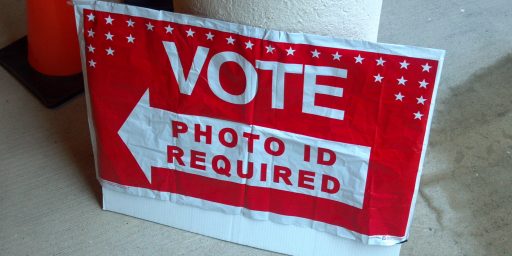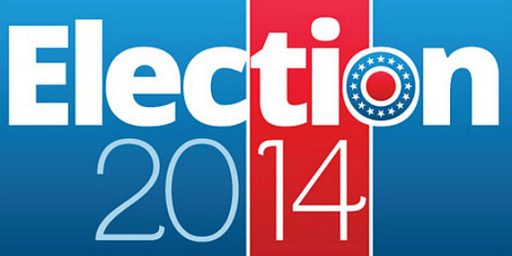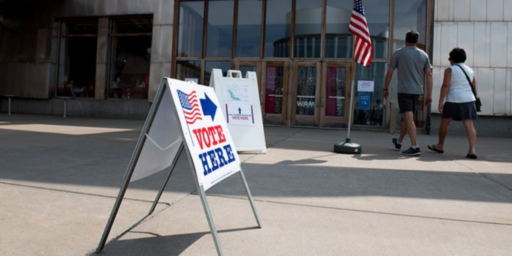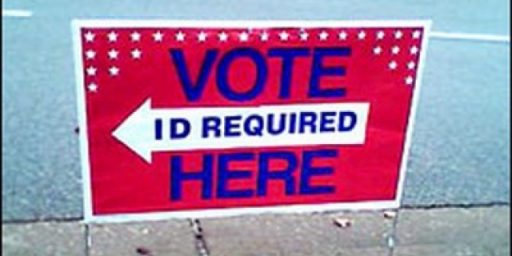The Apolitical
Thoreau at Unqualified Offerings correctly notes: Most people just barely care about politics.
And after an illustrating anecdote concludes: “I think we need to keep this in mind when we think about political discourse in our country.”
‘Tis true (and hard for we political junkies to understand sometimes).
Of course, the people about whom Thoreau is referring likely do not participate in the political discourse too terribly much (and a lot of them don’t even participate in electoral politics all that much: witness the voter turnout numbers in general, and especially in non-presidential elections).
The poor turnout issue does make me think: what is it about US politics that makes turnout (and interest in government) so much less than in most democracies? The answers include, I think, the complexity of our system and the lengthy ballot.
This is a topic worthy of far more discussion, but much of the problem is linked to the fact that separation of powers and federalism both are mechanisms that make clear responsibility difficult to assign, which leads to voter frustration over the value of participating.






Considering how many people conflate state taxes with federal taxes when they complain about the prices of things going up, like gas, this is not surprising.
He is talking about my wife.
She does not understand my preoccupation with politics at all. She votes, but up until a week before the election she ignores everything, does not listen to the news or even the radio for music. And it is not because she does not care, she does, as much as I. But…
Where I get angry at the latest rightwingnuttery nonsense, or the latest capitulation from the left, or the absolute nothingness that can come from both sides (think climate change) and will sit down and write my congresscritters… She is blithely ignorant and untroubled. Once upon a time she was a faithful listener of NPR on her morning and evening commutes, she would get angry and troubled and worried and….
Now she listens to books on tape and her blood pressure is much lower. She figures I get pi$$ed off enuf for the both of us.
One conclusion is that despite the way it looks to the small number of highly energized political nuts like us, things aren’t really that bad. The acquiescence of the majority is a stamp of approval; they are satisfied. If things got really really bad — either to left or right — they’d wake up and participate long enough to set things the way they want them then go back to sleep.
My wife thinks that I have no life outside of politics and the news. I watch very little “TV News” but I read a lot about it from better sources.
The poor turnout issue does make me think: what is it about US politics that makes turnout (and interest in government) so much less than in most democracies? The answers include, I think, the complexity of our system and the lengthy ballot.
This is a topic worthy of far more discussion, but much of the problem is linked to the fact that separation of powers and federalism both are mechanisms that make clear responsibility difficult to assign, which leads to voter frustration over the value of participating.
You would be shocked at how many people I have explained the workings of the electoral college to.
@Bart Wallace:
Bart, Bart, Bart: you forget with whom you speak. I would not be surprised at all 😉
(Indeed, I was interviewed by a reporter from a local newspaper before the election and it became manifestly obvious as I spoke that the reporter had no clue about how we elect the president…).
Another thing you have to keep in mind, politics, or rather, ‘Electioneering’, is not a 24/7/365 type of thing in most other countries. Here in Canada, an election is ‘called’. Then, we have maybe 6 weeks of having to be inundated with ads, news, talking points, etc. Everything in Parliament is done by majority vote, and pretty much along party lines irregardless of public input or outcry. Eventually the ruling party will piss everyone off enough (usually after 2 or 3 terms), and we try the other party. Lather, Rinse, Repeat.
As well, neither party (yes we have more than 2 parties, but none of the others has a chance in hell of ever forming a majority), would ever even think of touching our Health Care or revisiting the abortion issue. Human Rights are sacrosanct here for everyone, irregardless of race, colour, creed, or sexual preference. We too believe in ‘free speech’, but most follow the ‘my rights end where yours begin’ line of thought. Hate Speech is not looked upon kindly, no matter the topic. We do try to keep our crazies on either side of the spectrum in the fringes where they belong.
*See, this explains why you have so many Canadians interested in American Politics – ours are so bloody boring. Hell, our Prime Minister apologized for running an ad that supposedly insulted his opponent!!!!
@pcbedamned: Indeed. The fixed electoral calendar in the US has substantial side-effects that are not present in parliamentary systems.
Of course the problem is that since they don’t care about the actual politics involved, it ends up becoming just another team sport. They vote Democrat or Republican not because they agree with one agenda or the other, but because it’s “Our Team”.
Well, here in Brazil there are polls showing that if voting were not mandatory less than 20% of the voting age population would vote.
@Andre Kenji: Rather interesting (and surprising, to be honest). Would you happen to have a link to that poll?
@Stormy Dragon: I suspect that the “our team” aspect you refer to is more agenda based than you may believe that it is, but that is a topic for a different post.
More to the point, I also suspect that most of the disinterest in politics may stem from the degree to which the margins appear to be in control of the agendas of the parties. Contrary to Dr. Joiner’s post last week, I see the country as still predominantly “center right.” In fact, the argument that he is making seems really to be that it is not “center right” because it is to the left of where he stands–and, of course, he stands at absolute top dead center (as do we all–including Sean Hannity, Rush Limbaugh. and Ann Coulter if you were to ask them probably). In the present circumstances, becoming exercised about a system run by spineless toadies and sycophants who spend much of their efforts currying the favor of power brokers and “party activists” seem less than fully profitable.
This coming from a person who follows politics, but doesn’t vote. Is that ironic, or what?
@Steven L. Taylor: I found polls with better numbers, something like 50% of the people polled saying that they would vote if vote were not mandatory. But considering the way that people answers these polls these are still very low numbers.
http://revistaepoca.globo.com/Revista/Epoca/0,,EMI144089-18176,00-DATAFOLHA+VOTO+OBRIGATORIO+DIVIDE+OS+BRASILEIROS.html